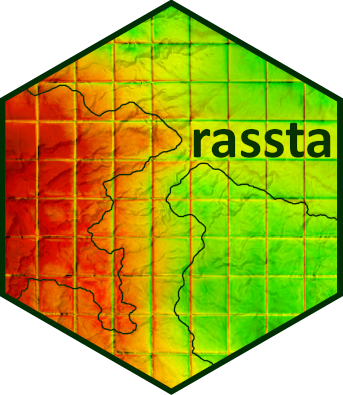The hardware and bandwidth for this mirror is donated by METANET, the Webhosting and Full Service-Cloud Provider.
If you wish to report a bug, or if you are interested in having us mirror your free-software or open-source project, please feel free to contact us at mirror[@]metanet.ch.

rassta (raster-based
spatial stratification
algorithms) is a collection of algorithms for the
spatial stratification of landscapes, sampling, and modeling of
spatially-varying phenomena in R.
rassta offers a simple framework for the stratification
of geographic space based on raster layers representing landscape
factors and/or factor scales. The stratification process follows a
hierarchical approach, which is based on first level units (i.e.,
classification units) and second-level units (i.e., stratification
units). Nonparametric techniques allow to measure the correspondence
between the geographic space and the landscape configuration represented
by the units. These correspondence metrics are useful to define sampling
schemes and to model the spatial variability of environmental
phenomena.
rassta is available from CRAN, so the current
released version can be installed as follows:
install.packages("rassta")To install the development version from github, please use:
remotes::install_github("bafuentes/rassta")

Full documentation of rassta including some vignettes
can be found here
rassta greatly benefits from past and current efforts to
make spatial data analysis fully operational in R, which in turn have
benefited from titans like GDAL, PROJ, GEOS, etc. Special thanks to the
minds behind the terra, rgdal,
rgeos, and sf packages, and those behind the
other packages that rassta depends on as well.
A journal article describing the methods and theoretical background
of rassta has been published by the R Journal and it is
available here: https://doi.org/10.32614/RJ-2022-036. You can use
citation("rassta") to get a BibTeX entry for LaTeX.
These binaries (installable software) and packages are in development.
They may not be fully stable and should be used with caution. We make no claims about them.